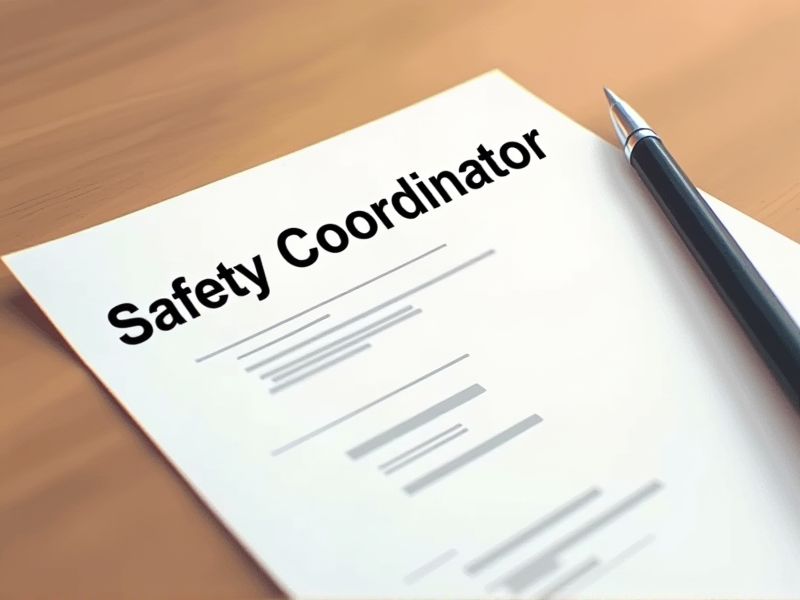
A Safety Coordinator plays a crucial role in minimizing workplace hazards and ensuring compliance with safety regulations, which necessitates a deep understanding of industry standards and practices. Certifications validate this expertise, enhancing a Safety Coordinator's credibility and effectiveness in implementing safety protocols. Employers often require these certifications to ensure their safety personnel are equipped with the knowledge to address complex safety challenges. Examine these essential certifications that can elevate your role as a Safety Coordinator.
OSHA 10-Hour General Industry Certification
Obtaining the OSHA 10-Hour General Industry Certification equips a Safety Coordinator with essential knowledge of workplace safety standards. This certification helps in identifying and mitigating potential hazards, reducing the likelihood of workplace accidents. Proper understanding of OSHA regulations ensures compliance, preventing costly fines and improving the company's safety reputation. The training enhances the coordinator's capability to foster a safety-oriented culture among employees.
OSHA 30-Hour General Industry Certification
The OSHA 30-Hour General Industry Certification equips Safety Coordinators with comprehensive knowledge of workplace safety standards, reducing the likelihood of workplace accidents and enhancing overall safety management. Employers view this certification as a validation of a Safety Coordinator's competence, leading to improved trust and authority in enforcing safety protocols. The certification also ensures that Safety Coordinators are up-to-date with the latest federal safety regulations, thereby promoting compliance and minimizing potential legal liabilities. Possessing this certification often results in better job opportunities and career advancement for Safety Coordinators, as it demonstrates their commitment to maintaining a safe work environment.
Certified Safety Professional (CSP)
A Certified Safety Professional (CSP) enhances a Safety Coordinator's credibility, signaling rigorous expertise and adherence to industry standards. Companies often require CSPs to ensure compliance with regulatory bodies like OSHA, reducing risks and potential liabilities. The CSP credential supports advanced knowledge in hazard assessment and mitigation strategies, leading to safer work environments. Employees and stakeholders gain increased trust in a safety program managed by a CSP-credentialed professional.
Associate Safety Professional (ASP)
An Associate Safety Professional (ASP) designation equips a Safety Coordinator with advanced knowledge in identifying and mitigating workplace hazards, thereby reducing the likelihood of accidents. This credential reflects a deep understanding of current safety regulations, ensuring compliance and avoiding costly legal penalties. Safety Coordinators with the ASP certification leverage data-driven approaches to enhance organizational safety programs, driving continuous improvement. The ASP designation also sets professionals apart in a competitive job market, demonstrating a commitment to excellence in safety management.
Construction Health and Safety Technician (CHST)
The Construction Health and Safety Technician (CHST) provides specialized expertise in identifying and mitigating workplace hazards, which directly enhances the overall safety culture of a construction site. A Safety Coordinator benefits from the CHST's in-depth knowledge of regulations and compliance requirements, ensuring all safety protocols are up-to-date and correctly implemented. The CHST's role in conducting risk assessments and safety audits helps preemptively address potential dangers, significantly reducing the risk of accidents. By collaborating with a CHST, Safety Coordinators gain access to detailed training programs that elevate the entire workforce's safety awareness and response capabilities.
First Aid, CPR, and AED Certification
Obtaining First Aid, CPR, and AED Certification equips a Safety Coordinator with the skills to respond promptly to medical emergencies, potentially reducing the severity of an incident before professional help arrives. By having this certification, the coordinator can ensure a safer workplace environment, fostering confidence among employees. Businesses often face compliance requirements, and having certified coordinators can help meet safety regulations mandated by occupational health standards. Training in these areas can decrease the likelihood of severe workplace injuries or fatalities, leading to improved overall safety metrics.
Hazardous Materials (HAZMAT) Certification
Hazardous Materials (HAZMAT) Certification ensures a Safety Coordinator understands the risks associated with handling dangerous substances, thereby minimizing the potential for workplace incidents. Proper certification equips them with the knowledge to develop and implement safety protocols, protecting both personnel and the environment. Compliance with regulations like OSHA or DOT standards often requires certified personnel, reducing legal liabilities for organizations. A Safety Coordinator with HAZMAT Certification is more adept at emergency response, reducing the impact of potential hazardous material spills or accidents.
Industrial Hygiene Certification
Industrial Hygiene Certification equips a Safety Coordinator with the technical knowledge to identify and assess workplace hazards accurately. This ensures the implementation of effective controls, reducing the risk of occupational illnesses and injuries. Certification validates the competence of the coordinator, fostering trust and credibility within the organization. Regulatory compliance is maintained through standardized practices taught during certification, minimizing legal and financial liabilities.
Confined Space Entry Certification
Confined Space Entry Certification ensures a Safety Coordinator understands the unique hazards associated with enclosed areas, which can prevent serious accidents. Lack of proper knowledge and certification can lead to mismanagement of risks such as limited oxygen, toxic gases, or potential explosions. Certification provides essential training on emergency protocols, reducing response time and enhancing team safety. A Safety Coordinator with this certification can also ensure compliance with regulatory standards, avoiding legal repercussions and promoting a culture of safety.
Incident Investigation Certification
Holding an Incident Investigation Certification equips a Safety Coordinator with the skills to analyze workplace accidents systematically, leading to improved preventive measures. With enhanced investigation capabilities, they can identify root causes of incidents more accurately, reducing future risks. The certification provides standardized methodologies that ensure consistent safety practices within an organization. Employers seek certified coordinators to fulfill compliance with industry regulations, highlighting their commitment to maintaining a safe work environment.
Summary
With added certifications, you can enhance safety protocols and compliance in your organization. Certified knowledge enables the anticipation and effective mitigation of potential hazards. This leads to improved workplace safety and reduced incident rates. Consequently, you gain trust and credibility from employees and management alike, fostering a culture of safety.
